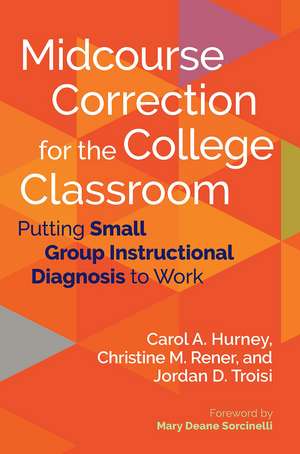Midcourse Correction for the College Classroom: Putting Small Group Instructional Diagnosis to Work
Autor Carol A. Hurney, Christine M. Rener, Jordan D. Troisien Limba Engleză Paperback – 29 dec 2021
| Toate formatele și edițiile | Preț | Express |
|---|---|---|
| Paperback (1) | 302.78 lei 6-8 săpt. | |
| Taylor & Francis – 29 dec 2021 | 302.78 lei 6-8 săpt. | |
| Hardback (1) | 998.53 lei 6-8 săpt. | |
| Taylor & Francis – 29 dec 2021 | 998.53 lei 6-8 săpt. |
Preț: 302.78 lei
Nou
Puncte Express: 454
Preț estimativ în valută:
57.94€ • 59.86$ • 48.22£
57.94€ • 59.86$ • 48.22£
Carte tipărită la comandă
Livrare economică 25 martie-08 aprilie
Preluare comenzi: 021 569.72.76
Specificații
ISBN-13: 9781642673135
ISBN-10: 1642673137
Pagini: 202
Dimensiuni: 152 x 229 x 11 mm
Greutate: 0.28 kg
Ediția:1
Editura: Taylor & Francis
Colecția Routledge
Locul publicării:Oxford, United Kingdom
ISBN-10: 1642673137
Pagini: 202
Dimensiuni: 152 x 229 x 11 mm
Greutate: 0.28 kg
Ediția:1
Editura: Taylor & Francis
Colecția Routledge
Locul publicării:Oxford, United Kingdom
Public țintă
Postgraduate and Professional Practice & DevelopmentCuprins
Foreword— Mary Deane Sorcinelli Dedication Acknowledgments Introduction. Setting the Stage Part One. In Search of Midcourse Correction:Discovering the SGID 1. The SGID 2. SGID Variations Part Two. Getting Started 3. Instuctor-to-Instructor SGIDs 4. SGID Programs Part Three. Making the Case 5. The Impact of the SGID on the Course 6. The Impact of the SGID Beyond the Course Part Four. Maximizing the Potential 7. Enhancing the SGID and SGID Programs 8. Engaging in SGID Research Conclusion. Unwrapping the Promise of the SGID Appendix A. Sample SGID Reports Appendix B. SGID Consultant Manual Appendix C. SGID Marketing Emails and Registration Form Appendix D. SGID Communications Appendix E. SGID Case Studies References About the Authors Index
Notă biografică
Dr. Mary Deane Sorcinelli is the Senior Research Fellow at the Institute for Teaching Excellence and Faculty Development at UMass Amherst. She was awarded, along with two colleagues, an NSF Institutional Transformation Grant through the American Association of Universities (AAU) in Washington, D.C.Mary Deane has directed a number of externally grant-funded projects aimed at promoting educational innovation from the Andrew W. Mellon, Microsoft, and William and Flora Hewlett Foundations, Carnegie Foundation for the Advancement of Teaching, and Pew Charitable Trusts. She has served on advisory boards and as an external evaluator of NSF ADVANCE CCLI, IUSE, and WIDER Grants.
Carol A. Hurney is Associate Provost for Faculty Development and the Founding Director of the Center for Teaching and Learning at Colby College.
Christine M. Rener is Professor of Chemistry and Vice Provost for Instructional Development and Innovation at Grand Valley State University.
Jordan D. Troisi is the Senior Associate Director of the Center for Teaching and Learning at Colby College.
Carol A. Hurney is Associate Provost for Faculty Development and the Founding Director of the Center for Teaching and Learning at Colby College.
Christine M. Rener is Professor of Chemistry and Vice Provost for Instructional Development and Innovation at Grand Valley State University.
Jordan D. Troisi is the Senior Associate Director of the Center for Teaching and Learning at Colby College.
Recenzii
"The authors have delivered the first one-stop, comprehensive guide to SGID in a research-informed, direct, and exceptionally readable style. They break down the last few decades of scholarship and practice on the SGID into coherent, useful, and well-organized advice, keeping the needs and interests of instructors and educational developers front and center, to the benefit of student learning. The drawing together of existing research and examples from the authors’ experiences in starting, renewing, and evaluating SGID programs will guide readers as they develop an SGID program and integrate it with other CTL services.
Hurney, Rener, and Troisi’s Midcourse Correction for the College Classroom is a powerful tool for educational development practice and a must-read for faculty and educational developers striving for improvement. It can support the development of a shared vision and understanding of SGID and can flexibly be used with individual faculty and colleague-based programs, across career stages and institutional types. Imagine a book that is like having a respected and trusted faculty colleague just down the hall, ready with a wonderful array of lessons learned and insights. That is this book."
—from the Foreword by Mary Deane Sorcinelli
Hurney, Rener, and Troisi’s Midcourse Correction for the College Classroom is a powerful tool for educational development practice and a must-read for faculty and educational developers striving for improvement. It can support the development of a shared vision and understanding of SGID and can flexibly be used with individual faculty and colleague-based programs, across career stages and institutional types. Imagine a book that is like having a respected and trusted faculty colleague just down the hall, ready with a wonderful array of lessons learned and insights. That is this book."
—from the Foreword by Mary Deane Sorcinelli
Descriere
This book is about using the Small Group Instructional Diagnosis (SGID) method to make improvements to the educational experience midcourse. The idea is to use this structured interview process to involve students in helping faculty improve a course while they are in it, potentially making a difference for themselves.
